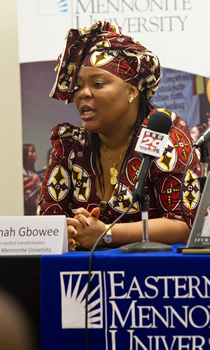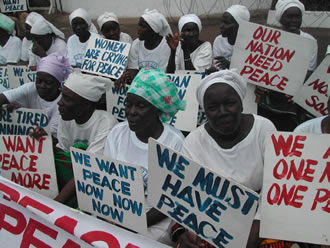"Put Away Your False Gods"
For Sunday November 6, 2011
Lectionary Readings (Revised Common Lectionary, Year A)
Joshua 24:1–3a, 14–25 or Wisdom of Solomon 6:12–16 or Amos 5:18–24
Psalm 78:1–7 or Wisdom of Solomon 6:17–20 or Psalm 70
1 Thessalonians 4:13–18
Matthew 25:1–13
Last month on public television I watched a few minutes of a history of the Aztec empire. I happened to see the part that described in graphic detail the Aztec practice of human sacrifice. In 1487, for example, the Aztecs sacrificed thousands of people in four days at the consecration of the Great Pyramid of Tenochtitlan. I couldn't watch, so I turned off the television and went to bed.
The religious legitimation of violence like human sacrifice makes it very hard to say that all religions are equally valid paths to God, or that they all teach the same thing: genocide, widow burning, caste systems, female genital mutilation, witch hunts, ritual abuse, ethnic cleansing, suicide bombers, and apartheid — all these evils and more have claimed religious sanction. They suggest that are true and false gods, good and evil religious practices, angels of light and demons of darkness, and that it's up to us to choose between the two.
 |
Leymah Roberta Gbowee, leader of the Liberia peace movement. |
No one should feel morally smug. Religious violence plays no favorites, either with the perpetrators or the victims. In his book Terror in the Mind of God (2000), Mark Juergensmeyer includes separate chapters on violence by Christians, Jews, Muslims, Sikhs, and Buddhists. When Religion Becomes Evil (2002) by Charles Kimball covers similar ground. The atheistic "religions" deserve special mention: the Soviet and Maoist "liberations" slaughtered 100 million people.
Only the modern state can unleash industrial scale violence like Auschwitz, Hiroshima, Rwanda or Darfur. Nationalism is our most violent god. In his study of mass murder called Worse Than War (2009), Daniel Goldhagen estimates that in the last century alone between 127–175 million people have been "eliminated." They came from all regions of the world, and from all social, economic and political groups. The vast majority of these victims were killed in their own countries, by their fellow citizens, by willing and non-coerced murderers, and almost never with any substantial dissent.
The myths, lies, denials, excuses, rationalizations, "self-exculpations," "prettified self-images," and "linguistic camouflage" of both active perpetrators and passive bystanders are legion. Although states alone have the power to eliminate a group, and political leaders bear unique responsibility, Goldhagen locates the problem in human agency. Eliminationism is not inevitable, accidental, a spontaneous eruption, or the work of "abstract forces or structures." Religious violence doesn't happen by chance; it's a choice.
And that's the message in the ancient text of Joshua: "choose for yourselves this day whom you will serve" (24:15). Put away the false gods of your ancestors. Forsake the pagan gods of the surrounding peoples. Worship the true and living God. Why? Because he is no petty tribal chieftain. Rather, he alone is "Lord of all the earth." He is God of "all peoples of the earth" (3:11, 13 and 4:24).
 |
caption goes here. |
The bloody book of Joshua, which in some ways exemplifies texts of terror, begins with the death of Moses and the ascension of Joshua, his aide-de-camp. The first half of the book is a triumphalistic history of military conquests. The second half of the book details the division of the conquered lands among the twelve tribes of Israel. The book then ends with Joshua's death and a plea for political sanity: "Fear the Lord and serve him with all faithfulness… Choose for yourselves this day whom you will serve… As for me and my household, we will serve the Lord" (Joshua 24:14,15).
That plea fell on deaf ears. The people made enthusiastic pledges of fidelity, but Joshua was dubious. Moses had led Israel in exodus out of Egyptian bondage, whereas under Joshua the oppressed had become the new oppressors. His genocidal campaigns "left no survivors. He totally destroyed all who breathed" (Joshua 10:40). Cities were burned, vanquished kings were publicly hanged, wealth was plundered, and peoples were enslaved. "Extermination without mercy" (11:20) was the stated goal. Divine approval was the putative rationale.
The religious legitimation of violence came at a steep price. Instead of political sanity, the reign of Joshua was followed by madness and mayhem — the period of the judges. In a single generation after the death of Joshua, Israel descended into 400 years of anarchy where, in the words of the very last sentence of the book, "every person did what was right in his own eyes" (Judges 21:25, 17:6). Israel's genocides had unleashed the dark forces of self-destruction.
In its religious life “the word of the Lord was rare” (1 Samuel 3:1). Idolatry was rampant. Debauchery characterized civic morality. Judges chapter 19, for example, records the murder of a nameless woman who was gang raped all night and then dismembered, a crime so heinous that it subsequently provoked civil war. "Think about it!" exclaims the exasperated narrator, "Consider it! Tell us what to do!" (Judges 19:30). On the economic front there were famines. It would be many long centuries before King David united the country.
 |
Then, long after David, the eighth-century prophets rose up and "flipped" the relationship between violence and religion. The supplementary reading from Amos 5:18–24 is only one example. Instead of legitimizing evil, true religion protests against any and every form of dehumanization. Religious ritual without human justice, says Amos, is a recipe for divine judgment: "I hate, I despise your religious feasts. Away with the noise of your songs! But let justice roll on like a river, righteousness like a never-ending stream."
About the same time that I saw the show about Aztec human sacrifice, I also watched a documentary film called Pray the Devil Back to Hell (2008). It tells the story of Muslim and Christian women who joined together in a peace movement to end fourteen years of civil war in Liberia. From 1989–2003 Liberians endured starvation, systematic rape, torture, mutilation and Charles Taylor's cocaine-crazed child soldiers. A third of the country was displaced; up to ten percent perished.
Instead of leaving history to chance, the women made a choice: no more war. No more legitimations of violence in the name of god, country, political liberation, or economic reform. Under the brave leadership of Leymah Roberta Gbowee, the women rose up and organized. They prayed and sang by the thousands in the fish market every day in their trade mark white tee shirts, in the sweltering sun and torrential rains. They announced "sex strikes" to all the men until the violence ceased. They picketed the American Embassy.
Their persistence forced Taylor to acknowledge them in a public ceremony. As the president fidgeted in his chair on stage, Gbowee spoke for the nation: "We are tired of war! Tired of running! Tired of begging for wheat! Tired of our daughters being raped!" They compelled Taylor and the rebel factions to the peace table in Ghana. When talks stalled after six weeks, they staged a sit in and prohibited the delegates from leaving the hall until they signed an agreement. After the peace accords in 2003, they led the nation in disarmament, then in voter registration and campaigning, all of which led to the election of Ellen Johnson Sirleaf as president of Liberia and the first African head of state in January 2006.
For further reflection
* Robert Wright, The Evolution of God (2010).
* Paul Froese and Christopher Bader, America's Four Gods: What We Say About God, and What That Says About Us (2011).
* R. Kirby Godsey, Is God a Christian? (2011).
* Robert Bellah, Religion in Human Evolution; From the Paleolithic to the Axial Age (2011).
Image credits: (1) Wikipedia.org; (2) and (3): Imdb.com.





